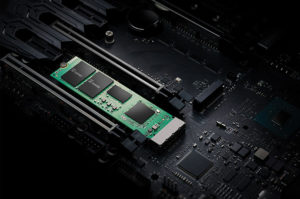
The Intel SSD 670p offers the right balance of performance, cost and power for mainstream gaming and everyday PC users. Intel introduced the SSD 670p in December 2020. (Credit: Intel Corporation)
Building on Intel’s Memory and Storage 2020 event in December, Intel’s now launching the Intel Solid State Drive (SSD) 670p — a 144-layer quad-level cell (QLC)-based client SSD.
What it does
Developed using the latest QLC technology, the Intel SSD 670p is equipped with a capacity of up to two terabytes in a single drive, offering tremendous value for everyday computing needs and mainstream gaming.
Compared with the previous generation Intel QLC 3D NAND SSD, the 670p offers improved performance, including 2X sequential read and a 20% endurance update.
Tuned for low-queue depth and mixed workloads to meet the demands of today’s most common computing needs, Intel’s newest client drive offers the right balance of performance, cost, and power
Available today, the Intel SSD 670p’s thin M.2 80mm form factor is an ideal fit for thin-and-light notebooks and desktop PCs.
Why it matters
Intel has been developing its QLC technology over the past decade to bring the performance and capacity needed to meet today’s PC storage needs, including top-of-the-line storage and the ability to efficiently manage high volumes of data.
The company’s QLC SSDs are built on floating gate technology — their data retention is a key competitive differentiator. The Intel SSD 670p’s new cell configuration results in high-capacity storage optimized for everyday computing needs at an affordable price and helps accelerate SSD adoption.
“The Intel SSD 670p is based on our 144-Layer QLC 3D NAND with 128 gigabytes per die and provides up to two times better read performance, 38% better random read performance, and up to 50% better latency over our previous generation SSDs,” said Rob Crooke, Intel senior VP and GM of the NAND Products and Solutions Group. “By offering peak performance, capacities up to two terabytes, and improved reliability, the Intel SSD 670p is the ideal storage solution for thin-and-light laptops.”
Filed Under: Components, News


Questions related to this article?
👉Ask and discuss on EDAboard.com and Electro-Tech-Online.com forums.
Tell Us What You Think!!
You must be logged in to post a comment.